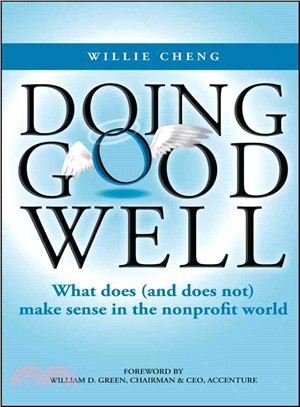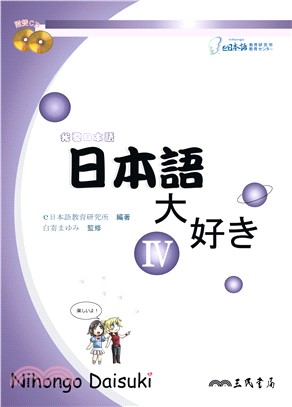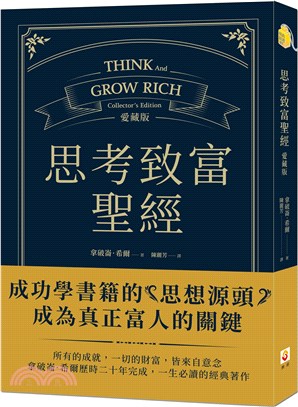DOING GOOD WELL:WHAT DOES (AND DOES NOT) MAKE SENSE IN THE NONPROFIT WORLD
商品資訊
ISBN13:9780470823897
出版社:JOHN WILEY & SONS;LTD
作者:CHENG
出版日:2008/09/09
裝訂/頁數:精裝/300頁
相關商品
商品簡介
作者簡介
名人/編輯推薦
目次
商品簡介
Why does a deserving charity struggle to make ends meet while another which squanders money, thrive? Because there is a structural disconnect between revenue and expenses in the nonprofit world.
Is continuous growth the hallmark of a successful charity? No, it’s just the opposite – the ultimate aim of a charity is to be extinct.
Would you use volunteers if it actually cost more than hiring paid skilled staff? Yes, if engagement with the community is crucial.
Call these examples, ironies, paradoxes or simply insights into why the charity sector is what it is. Doing Good Well is a thinking man’s guide to the nonprofit world. It is replete with nonprofit paradigms. It provides a different twist to what one might regard as straightforward notions such as mission, staff compensation, governance and corporate social responsibility. And it surprises and challenges even as it seeks to explain charity-specific issues such as charitableness, bridging the rich/poor divide, informed giving and social entrepreneurship.
And as he deconstructs existing paradigms, Willie Cheng creates new ones.
Through an easy writing style, hearty anecdotes and thought-provoking perspectives, Cheng engages the readers with a strategic review of not just the status quo but also the enormous potential in the nonprofit world. The theme of the book is change. Inasmuch as charities are about changing society for the better, this book seeks to set the stage for interesting introspection.
Whether you are a volunteer, business executive, nonprofit worker, governor or regulator, it’s time to start asking the questions that would help the charity sector itself change for the better. In Cheng’s words, charity is no longer simply about "Just Doing Good" but "Doing Good Well."
Is continuous growth the hallmark of a successful charity? No, it’s just the opposite – the ultimate aim of a charity is to be extinct.
Would you use volunteers if it actually cost more than hiring paid skilled staff? Yes, if engagement with the community is crucial.
Call these examples, ironies, paradoxes or simply insights into why the charity sector is what it is. Doing Good Well is a thinking man’s guide to the nonprofit world. It is replete with nonprofit paradigms. It provides a different twist to what one might regard as straightforward notions such as mission, staff compensation, governance and corporate social responsibility. And it surprises and challenges even as it seeks to explain charity-specific issues such as charitableness, bridging the rich/poor divide, informed giving and social entrepreneurship.
And as he deconstructs existing paradigms, Willie Cheng creates new ones.
Through an easy writing style, hearty anecdotes and thought-provoking perspectives, Cheng engages the readers with a strategic review of not just the status quo but also the enormous potential in the nonprofit world. The theme of the book is change. Inasmuch as charities are about changing society for the better, this book seeks to set the stage for interesting introspection.
Whether you are a volunteer, business executive, nonprofit worker, governor or regulator, it’s time to start asking the questions that would help the charity sector itself change for the better. In Cheng’s words, charity is no longer simply about "Just Doing Good" but "Doing Good Well."
作者簡介
Willie Cheng is a former partner of Accenture, a global management consulting, technology services and outsourcing firm. Prior to his retirement in 2003, he was the country managing director for Singapore and the managing partner of its Communications and High Tech practice in Asia.
Since his retirement, he has stayed involved with the business and the infocomm community. However, he spends the larger part of his time working with nonprofit organizations at the board and volunteer level. Among these, he is chairman of the Lien Center for Social Innovation and Caritas Singapore.
He was formerly chairman of the National Volunteer & Philanthropy Center where he started applying his management consulting background to nonprofit work.
He has written extensively on the nonprofit sector. This book, his first, is a distillation of these writings, updated for an international context.
He lives in Singapore with his wife, Julie, and two sons, Ian and Ivan.
He can be contacted at willie@doinggoodwell.net.
Since his retirement, he has stayed involved with the business and the infocomm community. However, he spends the larger part of his time working with nonprofit organizations at the board and volunteer level. Among these, he is chairman of the Lien Center for Social Innovation and Caritas Singapore.
He was formerly chairman of the National Volunteer & Philanthropy Center where he started applying his management consulting background to nonprofit work.
He has written extensively on the nonprofit sector. This book, his first, is a distillation of these writings, updated for an international context.
He lives in Singapore with his wife, Julie, and two sons, Ian and Ivan.
He can be contacted at willie@doinggoodwell.net.
名人/編輯推薦
Many in the local non-profit scene have lamented about the lack of published resources dealing with the conceptual and strategic issues that plague the non-profit world. Certainly, none has dealt specifically with the non-profit scene here in Singapore –until now. (SALT, 26 Sep-Dec 2008)
Doing Good Well: What Does (and Does Not) Make Sense in the Nonprofit World is a bold, exhaustive and analytical book on what makes the nonprofit sector tick -- or not. It is author Willie Cheng’s offering to a well-intentioned charity sector (including the public) in Singapore that, until recently, has seemed at a loss about effective governance. (Knowledge@SMU, 4/10/2008)
Five years after the eruption of the National Kidney Foundation (NKF) scandal, Mr Willie Cheng, who blew the whistle on its reserves, breaks his silence. With a book, no less. (The Straits Times, 8/10/2008)
A new book, Doing Good Well, was launched last Wednesday by local author Willie Cheng. The former managing partner of management consultancy Accenture is now a volunteer, board director and keen observer of the charity scene. (The Sunday Times, 12/10/2008)
It's no secret that Mr Willie Cheng - the man who blew the lid on the National Kidney Foundation (NKF) four years ago - has strong opinions when it comes to running a charity. Take, for example, his view that "the ultimate aim of a charity is to be extinct." (My Paper, 21/10/2008)
China’s charities, philanthropists and non-governmental agencies still have a long way to go to develop a fully trusting relationship with a slightly suspicious government. Yet the will to give is to be applauded. The next step will be working out how to move from deciding to do good to “doing good well”, as Cheng’s book urges, and making sure that all these new donations make a real difference. (Ethical Corporation Magazine, Nov '08)
In a provocative suggestion, Willie Cheng, author of a new book on not for profit management suggests "Ultimate success occurs when the nonprofit's mission is achieved and its existence in no longer needed". In the book, Doing Good Well Cheng proposes how nonprofit organisations can benefit from a corporate approach to thinking and practices while keeping their compassion. In fact he suggests that a not for profit cannot succeed with a purely corporate mindset. (Volunteer Bureau of Montreal, Nov '08)
Is continuous growth the hallmark of a successful charity? No, it's just the opposite - the ultimate aim of a charity is to be extinct. Or would you use volunteers if it actually cost more than hiring paid skilled staff? Yes, if engagement with the community is crucial. Call the above examples, ironies, paradoxes or simply insights into why the charity sector is what it is. (Malaysian Business, 1/11/2008)
It is one of India's many contradictions: Despite its vibrant civil society and impressive line-up of celebrity activists, the country's not-for-profit sector finds itself in the middle of a severe credibility crisis. It is burdened by stereotypes that have been built over the years, and not all of them are without substance. (Business World, 3/11/2008)
Few books look closely and comprehensively at the local non-profit sector, and here's one that not only examines the state of things, but also presents theories for why things are the way they are. As the former chairman of the National Volunteer and Philanthropy Centre, and now chairman of the Lien Centre for Social Innovation, Mr Willie Cheng is well placed to provide a guide to the non-profit world. (TODAY, 3/11/2008)
Willie Cheng's bluntness and radical ideas may leave many taken aback, but his unique style of humour makes this an interesting read at the same time. He provides a comprehensive analysis of what makes non-profit organizations work - or not. (Human Capital, Dec-08)
Interview with National Volunteer and Philanthropy Centre's former Chairman Willie Cheng. He speaks about his book "Doing Good Well" which focuses on the non-profit sector. He also shares his input about the effects of the economic downturn to charity works and the definition of a successful charity organisation. He shares his insights about what motivates a person to get into philanthropy. He also speaks about the challenges he faced while writing his book and social philanthropy. (938 LIVE, 16/01/09)
For people first coming into contact with the nonprofit world, especially those accustomed to the ways of the business sector, nonprofit organizations can seem strange, with unfamiliar customs and methods. Willie Cheng is such a person. A former partner in Accenture, a global management consulting company, he has spent his retirement working with and for nonprofit organizations, on boards and as a volunteer. (About.com, February 09)
The public and regulators are calling for greater accountability of charities in the face of recent scandals, making this book a must-read for anyone who wants to understand the world of philanthropy. Neo-philanthropists are employing business thinking while non-profit organisations are taking on social innovations, causing the line between business and charity increasingly hazy. (Singapore Accountant, Jan - Feb 09)
However, one crucial difference - money - separates the two, according to Willie Cheng, chairman of the Lien Centre for Social Innovation and a former chairman of the National Volunteer and Philanthropy Centre in Singapore. "Successful business entrepreneurs roll in it. Social entrepreneurs often have to make do without it," he writes in his recent book, Doing Good Well, explaining that most social entrepreneurs deal with issues "where getting an adequate economic return is a real challenge". (The Business Times, 02/03/09)
A new book about charity models provides a refreshing new take on the charity scene. It effectively reconciles the many apparent contradictions of the charity world. Written by Willie Cheng, a former managing partner of Accenture Singapore, it provides a business perspective to the nonprofit sector. (The Star, 28/03/09)
In this, his first book, Willie Cheng draws on his experience, both as a partner and managing director of the Singapore branch of the global management consulting, technology services and outsourcing firm Accenture and as the Chair of the National Volunteer and Philanthropy Center in Singapore, to explain and provide new perspectives on the principles and thinking behind the working of the non-profit sector. (Alliance, 01/03/09)
Doing Good Well: What Does (and Does Not) Make Sense in the Nonprofit World is a bold, exhaustive and analytical book on what makes the nonprofit sector tick -- or not. It is author Willie Cheng’s offering to a well-intentioned charity sector (including the public) in Singapore that, until recently, has seemed at a loss about effective governance. (Knowledge@SMU, 4/10/2008)
Five years after the eruption of the National Kidney Foundation (NKF) scandal, Mr Willie Cheng, who blew the whistle on its reserves, breaks his silence. With a book, no less. (The Straits Times, 8/10/2008)
A new book, Doing Good Well, was launched last Wednesday by local author Willie Cheng. The former managing partner of management consultancy Accenture is now a volunteer, board director and keen observer of the charity scene. (The Sunday Times, 12/10/2008)
It's no secret that Mr Willie Cheng - the man who blew the lid on the National Kidney Foundation (NKF) four years ago - has strong opinions when it comes to running a charity. Take, for example, his view that "the ultimate aim of a charity is to be extinct." (My Paper, 21/10/2008)
China’s charities, philanthropists and non-governmental agencies still have a long way to go to develop a fully trusting relationship with a slightly suspicious government. Yet the will to give is to be applauded. The next step will be working out how to move from deciding to do good to “doing good well”, as Cheng’s book urges, and making sure that all these new donations make a real difference. (Ethical Corporation Magazine, Nov '08)
In a provocative suggestion, Willie Cheng, author of a new book on not for profit management suggests "Ultimate success occurs when the nonprofit's mission is achieved and its existence in no longer needed". In the book, Doing Good Well Cheng proposes how nonprofit organisations can benefit from a corporate approach to thinking and practices while keeping their compassion. In fact he suggests that a not for profit cannot succeed with a purely corporate mindset. (Volunteer Bureau of Montreal, Nov '08)
Is continuous growth the hallmark of a successful charity? No, it's just the opposite - the ultimate aim of a charity is to be extinct. Or would you use volunteers if it actually cost more than hiring paid skilled staff? Yes, if engagement with the community is crucial. Call the above examples, ironies, paradoxes or simply insights into why the charity sector is what it is. (Malaysian Business, 1/11/2008)
It is one of India's many contradictions: Despite its vibrant civil society and impressive line-up of celebrity activists, the country's not-for-profit sector finds itself in the middle of a severe credibility crisis. It is burdened by stereotypes that have been built over the years, and not all of them are without substance. (Business World, 3/11/2008)
Few books look closely and comprehensively at the local non-profit sector, and here's one that not only examines the state of things, but also presents theories for why things are the way they are. As the former chairman of the National Volunteer and Philanthropy Centre, and now chairman of the Lien Centre for Social Innovation, Mr Willie Cheng is well placed to provide a guide to the non-profit world. (TODAY, 3/11/2008)
Willie Cheng's bluntness and radical ideas may leave many taken aback, but his unique style of humour makes this an interesting read at the same time. He provides a comprehensive analysis of what makes non-profit organizations work - or not. (Human Capital, Dec-08)
Interview with National Volunteer and Philanthropy Centre's former Chairman Willie Cheng. He speaks about his book "Doing Good Well" which focuses on the non-profit sector. He also shares his input about the effects of the economic downturn to charity works and the definition of a successful charity organisation. He shares his insights about what motivates a person to get into philanthropy. He also speaks about the challenges he faced while writing his book and social philanthropy. (938 LIVE, 16/01/09)
For people first coming into contact with the nonprofit world, especially those accustomed to the ways of the business sector, nonprofit organizations can seem strange, with unfamiliar customs and methods. Willie Cheng is such a person. A former partner in Accenture, a global management consulting company, he has spent his retirement working with and for nonprofit organizations, on boards and as a volunteer. (About.com, February 09)
The public and regulators are calling for greater accountability of charities in the face of recent scandals, making this book a must-read for anyone who wants to understand the world of philanthropy. Neo-philanthropists are employing business thinking while non-profit organisations are taking on social innovations, causing the line between business and charity increasingly hazy. (Singapore Accountant, Jan - Feb 09)
However, one crucial difference - money - separates the two, according to Willie Cheng, chairman of the Lien Centre for Social Innovation and a former chairman of the National Volunteer and Philanthropy Centre in Singapore. "Successful business entrepreneurs roll in it. Social entrepreneurs often have to make do without it," he writes in his recent book, Doing Good Well, explaining that most social entrepreneurs deal with issues "where getting an adequate economic return is a real challenge". (The Business Times, 02/03/09)
A new book about charity models provides a refreshing new take on the charity scene. It effectively reconciles the many apparent contradictions of the charity world. Written by Willie Cheng, a former managing partner of Accenture Singapore, it provides a business perspective to the nonprofit sector. (The Star, 28/03/09)
In this, his first book, Willie Cheng draws on his experience, both as a partner and managing director of the Singapore branch of the global management consulting, technology services and outsourcing firm Accenture and as the Chair of the National Volunteer and Philanthropy Center in Singapore, to explain and provide new perspectives on the principles and thinking behind the working of the non-profit sector. (Alliance, 01/03/09)
目次
Chapter 0. Introduction.
Of Paradigms and Doing Good.
Sector Structure & Governance.
Chapter 1. The Nonprofit Marketplace.
The Missing Hand of Adam Smith.
Chapter 2. Informed Giving.
The Visible Hand of the Donor.
Chapter 3. Nonprofit Governance.
Who Governs a Nonprofit, Really?
Chapter 4. Regulation.
Black Box or Glass House?
Non-Profit Management,
Chapter 5. Nonprofit Mission.
Endgame: Extinction.
Chapter 6. Reserves & Fundraising Targets.
The Problem of Plenty.
Chapter 7. Staff Compensation.
Heart Work, Less Pay.
Giving.
Chapter 8. Corporate Social Responsibility.
Is the Business of Business just Business?
Chapter 9. The Charity Quotient.
How Charitable are You, Truly?
Chapter 10. Planned Giving.
Raising Money from the Dead.
Chapter 11. Elite Giving.
Elite or e-LITE Giving?
Chapter 12. International Giving.
Charity Without Borders.
Chapter 13. Volunteerism.
Free Labor Wanted, but Conditions Apply.
Social Innovation.
Chapter 14. Philanthropy.
The Second Philanthropic Revolution.
Chapter 15. Social Entrepreneurship.
Innovating Social Change.
Chapter 16. Social Enterprises.
Profits for Nonprofits.
Doing Good Well?
Chapter 17. The Rich / Poor Divide.
For Richer or For Poorer?
Chapter 18. Nonprofit Qwerties.
Quitting Quirky Quagmires.
Chapter 19. Case Study.
NKF: The Saga and It's Paradigms.
Chapter 20. The Charity Ecosystem.
Doing Good Better.
Of Paradigms and Doing Good.
Sector Structure & Governance.
Chapter 1. The Nonprofit Marketplace.
The Missing Hand of Adam Smith.
Chapter 2. Informed Giving.
The Visible Hand of the Donor.
Chapter 3. Nonprofit Governance.
Who Governs a Nonprofit, Really?
Chapter 4. Regulation.
Black Box or Glass House?
Non-Profit Management,
Chapter 5. Nonprofit Mission.
Endgame: Extinction.
Chapter 6. Reserves & Fundraising Targets.
The Problem of Plenty.
Chapter 7. Staff Compensation.
Heart Work, Less Pay.
Giving.
Chapter 8. Corporate Social Responsibility.
Is the Business of Business just Business?
Chapter 9. The Charity Quotient.
How Charitable are You, Truly?
Chapter 10. Planned Giving.
Raising Money from the Dead.
Chapter 11. Elite Giving.
Elite or e-LITE Giving?
Chapter 12. International Giving.
Charity Without Borders.
Chapter 13. Volunteerism.
Free Labor Wanted, but Conditions Apply.
Social Innovation.
Chapter 14. Philanthropy.
The Second Philanthropic Revolution.
Chapter 15. Social Entrepreneurship.
Innovating Social Change.
Chapter 16. Social Enterprises.
Profits for Nonprofits.
Doing Good Well?
Chapter 17. The Rich / Poor Divide.
For Richer or For Poorer?
Chapter 18. Nonprofit Qwerties.
Quitting Quirky Quagmires.
Chapter 19. Case Study.
NKF: The Saga and It's Paradigms.
Chapter 20. The Charity Ecosystem.
Doing Good Better.
主題書展
更多
主題書展
更多書展本週66折
您曾經瀏覽過的商品
購物須知
外文書商品之書封,為出版社提供之樣本。實際出貨商品,以出版社所提供之現有版本為主。部份書籍,因出版社供應狀況特殊,匯率將依實際狀況做調整。
無庫存之商品,在您完成訂單程序之後,將以空運的方式為你下單調貨。為了縮短等待的時間,建議您將外文書與其他商品分開下單,以獲得最快的取貨速度,平均調貨時間為1~2個月。
為了保護您的權益,「三民網路書店」提供會員七日商品鑑賞期(收到商品為起始日)。
若要辦理退貨,請在商品鑑賞期內寄回,且商品必須是全新狀態與完整包裝(商品、附件、發票、隨貨贈品等)否則恕不接受退貨。






















